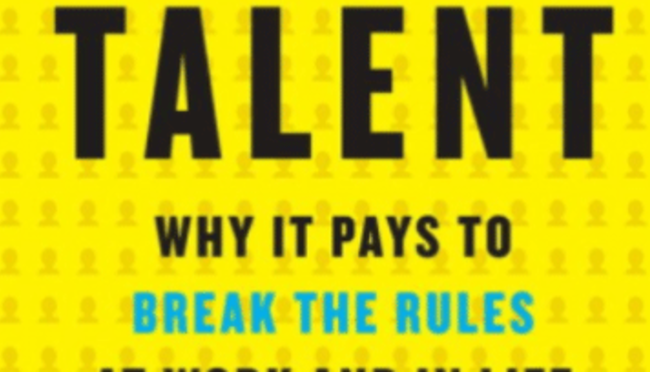Personal Characteristics →
→

- 23 May 2023
- Research & Ideas
Face Value: Do Certain Physical Features Help People Get Ahead?
Society seems to reward people with particular facial features. Research by Shunyuan Zhang and colleagues uses machine learning to analyze traits that people associate with charisma. The findings highlight opportunities to enhance one's image—and challenge bias.

- 30 Apr 2018
- Book
How to Be a Rebel Leader
In the book Rebel Talent, Francesca Gino argues companies should encourage rebellion in their workplaces. Quiz: Discover what type of rebel you really are. Open for comment; 0 Comments.
- 17 Jun 2015
- Lessons from the Classroom
Excellence Comes From Saying No
In a new course designed by Frances Frei and Amy Schulman, business and law students help each other define and achieve their own interpretations of success. Lesson one: You can't be great at everything. Open for comment; 0 Comments.

- 14 May 2015
- Working Paper Summaries
Humblebragging: A Distinct-and Ineffective-Self-Presentation Strategy
To humblebrag is to make a boast sound like a complaint, as in the example, "It annoys me when people mistake me for a celebrity." Humblebragging is so common in social media and everyday life that one could assume it is an effective self-promotional tactic. Yet five studies show this tactic tends to backfire because it makes other people doubt the sincerity of the humblebragger. Indeed, straightforwardly bragging is the better way to go. The authors of this paper also examine the psychology underlying humblebragging as an impression management tactic and highlight the role of perceived sincerity in impression management. Closed for comment; 0 Comments.
- 11 Feb 2015
- Research & Ideas
Politicians Benefited From Using Toxic Loans
A new study by Boris Vallée and Christophe Pérignon offers evidence that local politicians in France (and probably elsewhere) used high-risk loans for political gain in the years leading up to the recent financial crisis. The strategy worked: Toxic loans helped mayors get reelected. Open for comment; 0 Comments.
- 03 Dec 2014
- What Do You Think?
Can the Brilliant Jerk Be Managed Effectively?
SUMMING UP—"Brilliant jerks" dot every organization. But what to do about them? Jim Heskett's readers offer a range of remedies intended to capture their brilliant performance while reducing their toxic personalities. Closed for comment; 0 Comments.
- 10 Sep 2014
- Research & Ideas
Become a Value Creator
Managers who adopt a mindset to create value hold the key to becoming truly successful leaders, says Brian Hall. Closed for comment; 0 Comments.
- 28 Jul 2014
- Research & Ideas
Eyes Shut: The Consequences of Not Noticing
In his new book The Power of Noticing: What the Best Leaders See, Max Bazerman explains how and why many executives fail to notice critical information in their midst. Open for comment; 0 Comments.

- 25 Jun 2014
- Working Paper Summaries
Does ‘Could’ Lead to Good? Toward a Theory of Moral Insight
When people encounter difficult ethical challenges, research has shown, they generally ask themselves the question, "What should I do?" Organizations, too, frame the principles to guide managerial conduct in terms of "should." Despite the pervasiveness of having a "should" mindset when confronting moral dilemmas, however, the authors of this paper argue that a significant class of ethical challenges, often overlooked in efforts to understand misconduct, benefit from the application of unconventional thinking. When encountering ethical dilemmas, shifting one's mindset from "What should I do?" to "What could I do?" generates moral insight, defined as the realization that ostensibly competing values are not entirely incompatible. Moral insight allows for exploration of more possible solutions beyond the apparent constraints of the problem provided, and for the formulation of creative solutions that satisfy multiple moral imperatives. Although our natural inclination is to contemplate dilemmas with a "should" mindset, the authors argue that adopting a "could" mindset opens a broader range of possibilities and brings us one step closer to moral insight. Key concepts include: Moral insight is generated when individuals are prompted to consider the question "What could I do?" in place of their intuitive approach of considering "What should I do?" Employees and teams might devise practical solutions that resolve the inherent tension in a dilemma. Rather than assume a fixed contest that requires adjudication and a tradeoff, the research indicates that with some unconventional thinking, managers can generate solutions to ethical dilemmas. Closed for comment; 0 Comments.
- 23 Jun 2014
- Research & Ideas
In Venture Capital, Birds of a Feather Lose Money Together
The more affinity there is between two VCs investing in a firm, the less likely the firm will succeed, according to research by Paul Gompers, Yuhai Xuan and Vladimir Mukharlyamov. Closed for comment; 0 Comments.

- 14 May 2014
- Working Paper Summaries
Morality Rebooted: Exploring Simple Fixes to Our Moral Bugs
Although scholars know far more now than they used to about the conditions under which individuals are likely to behave, current understandings are still primarily descriptive. This paper responds to the challenge of advancing knowledge of unethical behavior from largely descriptive research to a framework aimed to reduce or even eliminate unethical behavior in organizations. The goal is twofold: First, the authors identify approaches to mitigating unethical behavior based on empirical evidence from existing research in moral psychology and behavioral ethics. Second, they develop a framework for evaluating different strategies with prescriptive recommendations on how to reduce unethical behaviors. Overall they find that ethical fixes emerge in two broad categories: values-oriented and structure-oriented approaches. Values-oriented approaches shift people's preferences to be moral, whereas structure-oriented approaches seek to design incentives, decisions, and tasks such that the unethical option is less tempting. Based on theory and empirical findings, the authors propose that adopting both values-oriented and structure-oriented approaches mitigates the risk of adverse effects from one strategy taken from a single approach. Key concepts include: This paper discusses the power of subtle changes and shows how they can point our moral compass toward a more ethical direction. The distinction the authors draw between values-oriented and structure-oriented approaches demonstrates that there is no one right approach to reduce unethical behavior in organizations and society more broadly. The prescriptions based on ethics research discussed here are grounded in economic and psychological models of unethical behavior. Closed for comment; 0 Comments.
- 30 Apr 2014
- Research & Ideas
Venture Investors Prefer Funding Handsome Men
Studies by Alison Wood Brooks and colleagues reveal that investors prefer pitches from male entrepreneurs over those from female entrepreneurs, even when the content of the pitches is identical. And handsome men fare best of all. Open for comment; 0 Comments.
- 12 Mar 2014
- Lessons from the Classroom
Managing the Family Business: Firing the CEO
Firing a CEO is never easy—but the task gets even more difficult in a family business. John A. Davis discusses when to change out the chief executive. Open for comment; 0 Comments.
- 12 Feb 2014
- Research & Ideas
Private Sector, Public Good
What role, if any, does business have in creating social good? A new seminar series at Harvard Business School tackles this complex question. Closed for comment; 0 Comments.
- 18 Dec 2013
- HBS Case
Lessons from the Lance Armstrong Cheating Scandal
Clayton S. Rose's recent case study looks at the behavior of teammates who were swept up in Lance Armstrong's cheating scandal. When do followers need to break away from their leader? Closed for comment; 0 Comments.
- 28 Oct 2013
- Research & Ideas
Book Excerpt: The Good Struggle: Responsible Leadership in an Unforgiving World
In a turbulent, sometimes dangerous world, responsible leaders need a broader view of critical decisions. An excerpt from Joseph L. Badaracco's new book. Closed for comment; 0 Comments.

- 14 Aug 2013
- Working Paper Summaries
Firm Competitiveness and Detection of Bribery
Bribery is widespread around the world, illegal, detrimental to economic progress and social stability, and at the same time it can have clear economic benefits for a firm. While the benefits of bribery for a firm, through acquisition of contracts or avoidance of government bureaucracy, are intuitive and well documented, the costs after detection are less well understood. In this paper the author examines how the impact on firm competitiveness from the detection of bribery varies with the identity of the initiator, the method bribery was detected, and the firm's response after detection. All three dimensions are significantly associated with the impact on firm competitiveness. In addition, the data suggest that the most significant impact is on employee morale, followed by business relations and reputation, and then regulatory relations. Key concepts include: Internally initiated bribery from senior executives is correlated with higher likelihood of significant impact. Bribery cases detected by the internal control systems of the firm are associated with a lower likelihood of significant impact on the business and regulatory relations of a firm. Firms that responded by firing an employee or ceasing business relations with outside parties that initiated the bribery have lower likelihood of significant impact. Understanding how managers' perceptions of impact on firm competitiveness vary with characteristics of the bribery case is likely to provide with useful evidence on how managers think of the costs of bribery. Closed for comment; 0 Comments.
- 11 Feb 2013
- Research & Ideas
Neuroeconomics: Eyes, Brain, Business
At first glance, a neuroscientist and a business school might seem an odd fit. But in fact economists have been paying increasing attention to how the brain works. Christine Looser discusses her research on how the brain detects aliveness and the possible implications for organizations and advertisers. Open for comment; 0 Comments.
- 02 Jan 2013
- What Do You Think?
Should We Rethink the Promise of Teams?
Summing Up: Teams that are properly structured and managed can support innovative thinking that depends on contributions from both extroverts and introverts, according to Professor Jim Heskett's readers. Closed for comment; 0 Comments.

Do We Underestimate the Importance of Generosity in Leadership?
Management experts applaud leaders who are, among other things, determined, humble, and frugal, but rarely consider whether they are generous. However, executives who share their time, talent, and ideas often give rise to legendary organizations. Does generosity merit further consideration? asks James Heskett. Open for comment; 0 Comments.